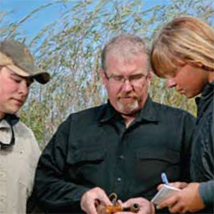If you enter his domain, the world of “bears and bad guys,” you’d better have it in large amounts if you want to succeed.  Passion, he says, will take you far in Lethbridge College’s School of Environmental Science, and in his discipline, conservation enforcement, even for students who weren’t academic stars in high school. But don’t come without it.
Passion, he says, will take you far in Lethbridge College’s School of Environmental Science, and in his discipline, conservation enforcement, even for students who weren’t academic stars in high school. But don’t come without it.
“You have to like working outdoors, have a concern for the welfare of animals, and be prepared to give 110 per cent,” says McRae, whose students now range across Canada in all four directions, their Lethbridge College diplomas and degrees welcomed as the gold standard in the field. “That kind of commitment is important in a field that works to ensure environmental quality and sustainability for future generations.”
Lethbridge College students have been working to make the world a better place for some 35 years, ever since Buck Cunningham, regarded as the godfather of the school’s “Envi-Sci” program, first convinced college hierarchy to include it in the program line-up.
Today, Lethbridge College grads are known from Nanton to Nunavut as the best in the business, whether they graduate in Conservation Enforcement, Renewable Resource Management or Environmental Assessment and Restoration. Many are now in supervisory positions and look for fellow alumni to fill open positions.
Mitch Kendall (Conservation Enforcement ’86) is among those alumni who have followed their passion. Kendall is a project co-ordinator for compliance and education for the B.C. Conservation Corporation based in Kamloops, as well as deputy director for the fish and wildlife branch.
Kendall says that while other institutions are making progress, Lethbridge College grads remain his first choice when hiring new staff.
“The Lethbridge College program stresses all of the right things. We still consider Lethbridge to be the better place for programming,” he says.
Today’s students will find that upon graduation, the jobs are waiting. In fact, there may soon be more jobs than applicants. Kendall says that historically he would have up to 600 qualified applicants vying for a few jobs. Now he may only have 40 applicants for 10 jobs. And the need for staff is only going to grow.
“There never has been a better time to be a student looking to come into this field,” says Kendall.
Chloe Marshall, Bachelor of Applied Science – Conservation Enforcement ’06 is now employed as a fish and wildlife officer for Red Deer County in Central Alberta. The 25-year-old actually began her post-secondary education with something else in mind.
Marshall went straight from high school to a large university in British Columbia. There she found she could be in a class of 500 students. She never got to know the professor and the professor certainly did not know the individual students. Coming to the College made a world of difference.
“The instructors at Lethbridge College are so personable. I could call them up right now and they would know exactly where I’m working, what I’m doing and they’d be interested in hearing about it. They would likely even know my favourite food,” Marshall says.
Marshall is one of a growing number of women pursuing a career in conservation enforcement. Of the 36 fourth-year degree students in conservation enforcement at Lethbridge College, eight are female.
Just as life in the field is experiencing change, Environmental Sciences at Lethbridge College continues to evolve.
While those seeking a higher hill to climb can opt to earn the Bachelor of Applied Science in Conversation Enforcement degree, a new two-year diploma in this area will be offered in September 2009. Natural Resource Compliance will stress sciences and upper-level law classes and it is being created in response to student needs, McRae says.
As a member of the program’s advisory committee, which is composed of professionals in the field, Kendall says the urgent need for qualified staff had some wondering if there was a need to wait for students to complete the four-year program.
McRae also notes the diploma helps students seeking summer employment qualify for positions that required that accreditation. Now students who earn the degree will have first earned a diploma.
The college also has new applied degrees in natural resource management and environmental assessment and restoration working their way through the provincial approval process.
The beauty of all Envi Sci programs is that they begin with a common first year, allowing learners to switch disciplines without wasting time and money redoing two semesters. That offers great flexibility for students, who get exposure to field-trained faculty. Transfer agreements with other institutions are also plentiful creating an almost unlimited range of opportunities. It all comes back to packing that passion.


